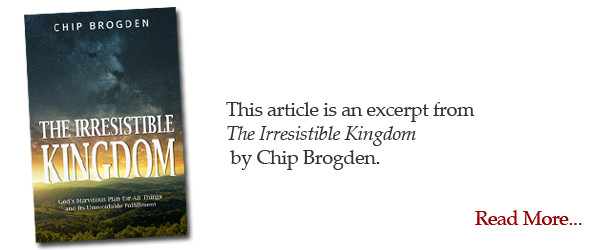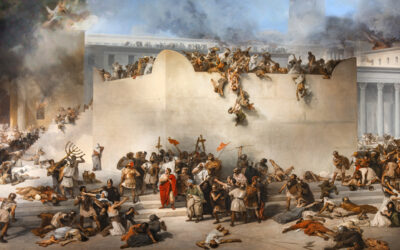Is today’s system of Churchianity any less narrow-minded, self-righteous, and self-centered than that system of Judaism which rejected Jesus Christ? Are our religious icons, television preachers, and institutional pastors any less blind leaders of the blind? Are Christians today any better able to recognize the true identity of the King and the spiritual nature, character, location, timing, scope, and covenantal basis of His Kingdom than their Jewish counterparts of two thousand years ago? Even with the benefit of hindsight and a complete Scriptural record, the gross spiritual immaturity among professing believers today is appalling.
As a result, most Christians are just as ignorant of the true nature of the Kingdom of God as their Jewish predecessors. “How foolish and blind those Jews were! They crucified their Messiah!” But before we criticize the Jews for their spiritual dullness let us look at ourselves. This spiritual blindness and misapprehension of God’s purpose is not limited to those first century Jews. As the saying goes, those who do not learn from history are doomed to repeat it. So far we Christians have done an excellent job of duplicating and perpetuating the same old Jewish misconceptions, even adding a few interesting twists to further compound the error.
(1) Christian Misconceptions Concerning the SPIRITUAL NATURE of the Kingdom
Whereas the Jews erred in their political perception of the Kingdom, most Christians err in their almost total lack of perception concerning any kind of Kingdom – political or otherwise. It is difficult to know which presents a greater challenge: redirecting an inaccurate impression of the Kingdom, or trying to cast a Kingdom vision where no vision exists. For most Christians today, the Kingdom of God is a vague, mystical non-reality. Heaven is a celestial rest home for dearly departed saints. The Kingdom is mentioned twice in the ceremonial recitation of the Lord’s Prayer but has virtually no impact on the spiritual consciousness of the average church-goer.
The Kingdom of God, for all intents and purposes, has been set aside to make way for the Religion of Christianity. The Church, not the Kingdom, is now the goal. The harlot Church, fancying itself to be the Bride of Christ has made itself the object of affection. The history of the Roman Catholic Church is a disgusting account of people endeavoring (and often succeeding) to become a political force in the earth, killing millions of people for the so-called cause of Christ. But the Roman Catholic Church is an easy, obvious target. The Protestant Church is just as guilty of politicizing the Kingdom of God with an unholy alliance between Church and State – for example, when King James asserted his “divine right of kings” ideology and insisted that he should be the political and the religious head of the Church of England.
Whenever Church and State come together the result is always persecution for anyone accused of “heresy.” Questioning the authority of the Church becomes grounds for legal action and subsequent punishment, imprisonment, or execution. The Salem Witch Trials in colonial Massachusetts (1692-93) were conducted by Puritan Christians. Whipped into a frenzied religious hysteria, they arrested and imprisoned more than one hundred fifty people as “witches”, indicted twenty-nine, and hanged nineteen. This is just one example of why religious zealots – no matter what their denominational or theological flavor – should under no circumstances be given political authority. Beware the ones who seek political office with the intention of enforcing their brand of Christianity on the rest of us.
What is the root problem? Failing to recognize the essentially spiritual nature of the Kingdom – bringing it down to earth and politicizing it, trying to create some kind of earthly power and authority in the name of God. It is a favorite tactic of carnal men, and this carnality extends to Christians as much as to Jews.
(2) Christian Misconceptions Concerning the TRUE IDENTITY of the King
The Jews did not, and do not, recognize Jesus as the Son of God or the Savior of All. Christians seemingly do recognize Jesus as such, so the issue can presumably be laid to rest. Unfortunately it cannot be laid to rest. While it is true that Christians are considered Christians precisely because they recognize Jesus as the Son of God and their Savior, there are too many who fail to apprehend Jesus as Lord.
Scripture does not make a distinction between Jesus as Savior and Jesus as Lord. From God’s perspective He is both. From the Ekklesia’s perspective He is both. But the Church constantly reinvents Jesus whenever convenient. Since salvation is considered mandatory, the Savior is universally recognized in Christendom. But Lordship is increasingly seen as something optional; that is to say, you can accept Jesus as Savior, and later on (if and when you get really committed), you can confess Him as Lord.
How do these things get started? It is impossible to say for sure just how this idea crept in, but it is the result of a religious system intent upon appealing to the largest possible number of people by any means necessary. If that means compromising the message, or leaving parts of it out so as not to create too much of an obstacle for people, then so be it. I have talked to many pastors who justify the spiritual immaturity of their congregation on the grounds that “they aren’t perfect, just forgiven.” No, they aren’t perfect. But they aren’t growing, either. Spiritually stagnant, lacking discernment, cold, dead, self-centered, self-absorbed – but believing that because they have “prayed the Sinner’s Prayer” they are on their way to heaven, and that’s all that matters.
The Church system is a business, and its product is not salvation, but the false assurance of salvation. It is certainly attractive to think that you can have Jesus as your Savior and ignore every requirement of discipleship that the Savior expects. An easy Gospel produces easy converts who accept an easy Jesus – but is this the same Jesus that the Bible talks about, or is it another Jesus that we have created as a carnal extension of ourselves, effectively making God in our own image?
Remember that God’s goal is the preeminence of Christ. It is impossible for Him to have the preeminence in a person who claims Him for salvation but refuses Him as Lord, Master, Teacher, and Example. The King and His Kingdom are all-inclusive. Yes the King offers salvation, but He also expects obedience: “If you love Me, keep My commandments.”[1] To the masses of people who refer to Jesus as “Lord,” He asks, “Why do you call Me ‘Lord, Lord’ but do not do what I say?”[2]
Paul did not say, “If you confess with your mouth the Savior Jesus… you will be saved.” He said, “If you confess with your mouth the LORD Jesus… you will be saved.”[3] If you are saved it is because you are submitted to the Lordship of Christ, not the Saviorship of Christ. Lordship includes Salvation, but there is no Salvation apart from Lordship. He is “Savior of All,”[4] but He is also “Lord of All.”[5] I cannot find a Scriptural justification for claiming half of Him while putting off the other half for later. Either He is Lord of all or He is not Lord at all.
(3) Christian Misconceptions Concerning the CHARACTER of the Kingdom
The carnal pursuit of fleshly power and control is just as prevalent in Churchianity as it is anywhere else in the world. Jesus said, “It must not be so among you,”[6] but we are obliged to confess that it is so among many who claim to be His people. Apart from acute self-righteousness, there is little discernable difference between people in the world and people in the religious system. The Church is merely an extension of their own carnal and fleshly desires for power, prestige, and privilege. Many people, unable to make a name for themselves in the world, find Religion an easy venue for self-promotion. They discover that most of the people are superstitious, easily manipulated, and easily deceived.
The speed with which a person can ascend to the leadership of a Christian church is astounding, and the damage they can cause is equally remarkable. Scriptural admonitions and qualifications are mostly ignored or overlooked as the ambitious, the charismatic, or the influential simply assume positions of authority by default.
For example, the Bible says that “the servant of the Lord must not strive; but be gentle to all.”[7] If we were to take that one single requirement seriously – gentleness – we would be compelled to disqualify the vast majority of elders, deacons, ministers, apostles, evangelists, bishops, reverends, cardinals, popes, prophets, pastors and teachers in the Church. On that one point alone most of them fail to meet the qualifications of a servant. Some may even appear to be gentle, but once you become a perceived threat to their authority you will discover something other than gentleness coming forth. Some cannot even bear to be questioned without taking offense and becoming hostile. That kind of leadership may be acceptable within the construct of Organized Religion but “servants” like that are unfit for service in the Kingdom of God – never mind the rest of the qualifications!
(4) Christian Misconceptions Concerning the TIMING of the Kingdom
The Christian perception of the timing of the Kingdom of God – when it will come – has a lot to do with their perception of what it is. Christians are generally divided among four schools of thought concerning the timing of the Kingdom of God. Those who see it only in terms of an earthly reign tend to put it off until some future time when Jesus will rule for one thousand years. Others who see it only in terms of “heaven” likewise put it off to a future time when they die; that is when they will “enter the Kingdom” and live happily ever after. Still others realize that “the Kingdom is within you,” and so they see it as having already been fulfilled in the past – they entered the Kingdom when they were born-again, so it is never given a second thought. Finally, advocates of the “Kingdom Now” movement seem intent on establishing something for God here on earth – with themselves as the duly appointed leaders.
The truth is that the Kingdom of God has arrived, it is arriving, and it will arrive. As we have seen, it is a progressive thing. To put all of it off into the future misses the point; the earthly reign of Christ is its culmination, not its beginning. Those who wait until then to enter the Kingdom will find themselves on the outside of it. Being ready is a consistent theme in the parables, as is the fate of those caught off-guard when the Son of Man returns.
Likewise, to put the Kingdom off into the past as having already come misses the point. What Jesus accomplished on the Cross set things in motion. The work of redemption was completed, but the work of the Kingdom was barely getting started. There are still “fields white unto harvest” that have yet to be brought in.[8] God’s Ultimate Purpose remains unfulfilled. The problem of Evil still remains. The Creation is still under a curse, waiting for its redemption.[9] And we are still waiting for His appearing and the gathering of all things to Himself.[10] It should be obvious that there is yet more to be done. To think of the Kingdom as having already come in its fullness is a serious error. Equally misguided is the idea that we can somehow usher in the Kingdom of God if only we can elect the right Christians into government. This is diametrically opposed to everything Jesus taught. It is the meek (not the ambitious) who will inherit the earth.[11]
(5) Christian Misconceptions Concerning the UNIVERSAL SCOPE of the Kingdom
If the Jews lacked a universal vision then Christians are even more lacking in this regard. God intends for us to be in the world, not of it. Some Christians seem to think they are not supposed to be in it, either. All too often the monastery, Christian school, traditional church, or house church becomes a fortress designed to keep the world outside and keep the Christian inside. But there is little difference between a fortress and a prison.
To the Jews there are only two kinds of people: the Jews and the non-Jews; the Hebrews and Everyone Else. To fundamentalist Christians there are only two kinds of people: the saved and the unsaved; the good and the bad; the Christian and the non-Christian; those who attend Church and those who do not. The end result is the same old self-righteousness of the Pharisee: “We are right and you are wrong; we are going to heaven and you are going to hell; stay away from me because I am holier than you, and you might contaminate me with your filth.”
Our King was accused by the religious of being a “friend of sinners.”[12] Could the same accusation be made against us? The religious are always careful to keep themselves at a safe distance from the worldly, but Jesus had no misgivings about rubbing shoulders with the dirtiest of them. How distressing to all religious sensibility is His pronouncement:
“The harlots and tax collectors go into the Kingdom before you…” (Mt. 21:31)
The Body of Christ, just like Israel of old, is blessed in order to be a blessing; that through us “all the nations of the world will be blessed.”[13] But, just like Israel of old, the Church has utterly rejected this stewardship and has become a country club for the Select Few instead of Heaven’s Embassy to All Nations. The Church is clearly more in love with the ninety-nine “righteous” who pay tithes and need no repentance than the one sheep who remains lost.
(6) Christian Misconceptions Concerning the COVENANTAL BASIS of the Kingdom
The record of the early Ekklesia reveals an intense struggle to break free from Judaism. Christianity then was not “Christianity” as we know it now. Believers in Jesus were really just a budding sect within Judaism. Let us revisit the circumstances in which the first apostles began their work.
In the first century there were four sects of Judaism: the Pharisees, the Sadducees, the Essenes, and a new sect called the Nazarenes: the disciples of Jesus of Nazareth. The Book of Acts shows how the Ekklesia began. It was centered in Jerusalem. They still kept the feasts. They went to the Temple to pray. And they preached Jesus to the Jews only.
Thank God, this situation would not continue for long. Right away the Holy Spirit began to challenge the notion that faith in Jesus was merely an extension of the current system of Judaism. This was not a mere reformation, it was a revolution. Jesus did, in fact, establish a new covenant, and this covenant was with “all,” not just those of Jewish descent. It was a hard lesson to learn but the Holy Spirit is a patient, if determined, Teacher.
Peter’s rooftop vision showed him that God no longer distinguished between Jew and Gentile.[14] But it was Paul who must be considered the first apostle to really grasp the full implications of the universal gospel and its new covenant. He taught the Gentiles that pure, simple, naked faith in Jesus Christ was sufficient. The Jewish believers saw it differently. They wanted the Gentile believers to observe the Jewish holy days and feasts, and (above all) circumcision as outward expressions of “righteousness.”
Unfortunately, Peter wavered in an attempt to please both sides of the issue. After a very public disagreement between Peter and Paul [15], attempts to turn the new Gentile disciples into full-fledged Jews was a lost cause. Thousands of people came to Christ through the missionary journeys of Paul and these new believers in Jesus were blatantly non-Jewish. No reasonable person could consider the Nazarenes a sect of Judaism anymore – there were too many Gentiles. A valiant effort by some Jewish believers[16] to persuade the Gentiles to at least adopt circumcision gained some momentum but was largely abandoned after Paul vehemently opposed it as “another Gospel… a perversion of the Gospel of Jesus Christ.”[17] And so it was in the Gentile city of Antioch – not the Jewish capital of Jerusalem – that the disciples were first called “Christians.”[18] It was not intended to be a compliment, but the name stuck and it immediately served the purpose of identifying them as something fundamentally distinct from Judaism.
The whole story is there in the Scriptural record. How sad that two thousand years later some Christians are falling prey to the same old line of thinking and allowing the Judaizers to undo what took so many years to accomplish. There is a distinct and popular movement in the Church to return back to our “Hebrew Roots” and observe the Old Testament feasts and holy days, call Jesus “Yeshua,” and insist that all true believers follow their example. Once again, history repeats itself.
There is much to be gained from a study of Judaism and the Old Covenant laws, but in too many cases it becomes a distraction from the New Covenant, and that makes it a distraction from Christ. For a non-Jewish person to purposely adopt a Jewish culture and phraseology that is foreign to them, all the while thinking that this is faith in Jesus, is misguided at best; at worst, it is simply adopting yet another legalistic religious system that stifles spiritual growth in grace. It betrays a fundamental lack of understanding concerning the Old and New Covenants – both of which are clearly delineated in the Scriptures – and it repudiates everything the Holy Spirit endeavored to teach the Early Ekklesia, effectively undoing all the progress made in those critical first years which established the universality of the Gospel. Not surprisingly, some of the more aggressive “Messianic Jews” today do not accept the Book of Hebrews, nor do they accept Paul as a genuine apostle.
(7) Christian Misconceptions Concerning the HEAVENLY LOCATION of the Kingdom
When the differences between Christianity and Judaism are confused then everything else becomes fuzzy. A majority of Christians join the Jews in looking to the earthly Jerusalem as the seat of government for the future Kingdom of God. We have seen that the New Testament teaches that this Kingdom is “within” and “comes from above.” It is the New Jerusalem.
But since this New Jerusalem is spiritual and invisible, it is an exceedingly difficult concept for earthly-minded people to grasp. It is easier, and much more convenient, to adopt a romanticized notion of the Old Jerusalem rising up from the earth with Jesus sitting on a throne on the old Temple mount. It becomes increasingly apparent that Christians get most of their ideas about the end times from television preachers, movies and bestselling books rather than from the Word of God.
The Terrible Price of These Misconceptions
The Jews completely failed to discern the mission and the message of the Lord Jesus. Theirs was not only a passive inability to understand what was going on, but an active resistance to the Son of God and everything which He represented:
“He was in the world, and the world was made by Him, and the world knew Him not. He came unto His own [people], but His own [people] received Him not.” (Jn. 1:10,11)
What was the result? Jerusalem was destroyed by the Romans in A.D. 70, just as Jesus said it would be.[19] The Temple was burned to the ground yet again. That religious system that sought so many times to destroy Christ was itself destroyed.
Do we suppose that the religious system of our day – “Churchianity” – is any less likely to meet the same fate? Are not the fundamental errors made by our religious leaders the same, if not worse, than the mistakes made by the Jews? Consider how many people Organized Religion has killed in the name of Jesus – from the Roman Catholic crusades to the Salem Witch Trials and beyond. Will God tolerate this indefinitely?
If the King were to re-visit our churches today, just as He visited the Jews two thousand years ago, is it not reasonable to expect that He would be as unrecognizable to us now as He was to them then? Are we not just as likely to perceive Him as a threat to our religious order, and put Him out of our churches, just as the Jews sought to destroy and discredit Him at every opportunity?
These questions are intended to be rhetorical, but I will answer them according to what I believe in my heart to be true, and what I have seen in my own experience. The Church today would not recognize Jesus Christ if He walked down the aisle and sat on the altar. The spiritual blindness and dullness in the Church today is worse than the Judaism that rejected and betrayed the Lord. They were corrupt – but we are no better. The Jews only had part of the picture; we have the complete picture. The Jews did not have the benefit of a New Testament to explain everything for them; but we have it, and we have the entire benefit of hindsight, a complete Scriptural record, and two thousand years of church history to show us the error of our ways. “Now all these things happened to [the Jews] for examples: and they are written for our warning, upon whom the ends of the world are come.”[20] In spite of this we turn a blind eye to it all and simply toe the party line. Meanwhile the Kingdom of God is unnecessarily hindered and delayed.
But it will not be delayed forever. Jesus must increase, therefore He will increase, and He is increasing. There will be a day of reckoning, and “to whom much is given, much is required.”[21] We who have been given so much more than the Jews will be held accountable in direct proportion to the light available to us.
Footnotes:
- Jn. 14:15
- Lk. 6:46
- Rom. 10:9
- 1 Tim. 4:10
- Acts 10:36
- Mt. 20:26
- 2 Tim. 2:24
- Lk. 10:2
- Rom. 8:22,23
- Eph. 1:10
- Mt. 5:5
- Lk. 7:34
- Gen. 26:4, et al.
- Acts 10:9-16
- Gal. 2:11-14
- Paul referred to some of them as “false brothers” (Gal. 2:4)
- Gal. 1:6,7
- Acts 11:26
- Lk. 21:20-24
- 1 Cor. 10:11
- Lk. 12:48













